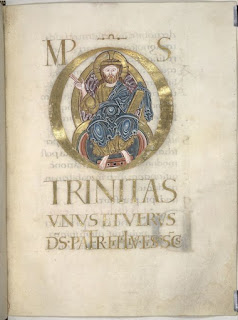Like Henry of Blois (who likely commissioned the Winchester Bible), Swithin (or Swithun) was an early bishop of Winchester. We know hardly anything contemporary about his life. He was probably born c.800 in Wessex, and one of the first public mentions of him is when he was consecrated a bishop on 30 October 852. His name is recorded as witness to nine charters, the earliest in 854. The Anglo-Saxon Chronicle mentions his death in the year 861.
It is only much later that his name was attached to the restored church at Winchester that had been dedicated to Saints Peter and Paul. The place was being rebuilt by Æthelwold, Bishop of Winchester (904 - 984), who maybe wanted to promote veneration of local saints over biblical ones. He was aided in this by Dunstan (909 - 988). Swithin's remains were moved to Winchester on 15 July 971 (15 July is his feast day in England), and that's when things got interesting.
Suddenly this obscure bishop had a prominent place in London, and people reported miracles attributed to him. The sick were healed, the blind could see. His shrine became a major pilgrimage site. Æthelwold decreed that the monks should all drop what they were doing at any time a miracle was announced and come to the shrine to worship. Supposedly this took place so frequently, even at night when the monks were in their beds, that they became too frustrated and stopped coming. Swithin then appeared in a dream to one or more of the monks, telling them that the miracles would stop if the monks did not deliver their praise. The story was spread, and the monks decided that they had to continue as before, no matter the time of day or night.
It was much later that other stories (with no known contemporary source) were told. He is often depicted as standing over eggs, because when some workmen maliciously broke the eggs of an old woman, Swithin found the eggs and made them whole.
There is another bit of lore ascribed to him:
St Swithun's day if thou dost rain
For forty days it will remain
St Swithun's day if thou be fair
For forty days 'twill rain nae mare
If it rains on 15 July, rain will persist for 40 days more. Buckinghamshire has simplified this:
If on St Swithun's day it really pours
You're better off to stay indoors
Swithin has made a mark on popular culture. Jane Austen's last poem had Saint Swithin antagonizing race runners in Winchester. St. Swithin's Day is referred to in the TV show Sopranos and in an episode of The Simpsons.
So what about the men who "brought Swithin back" to prominence, Æthelwold and Dunstan? Let's take a look at them next


